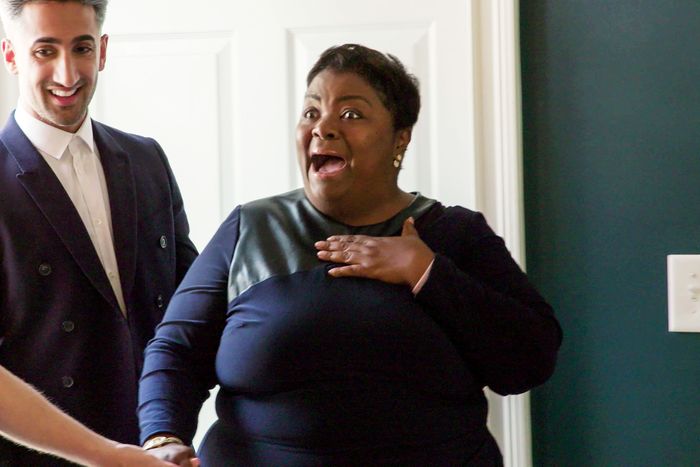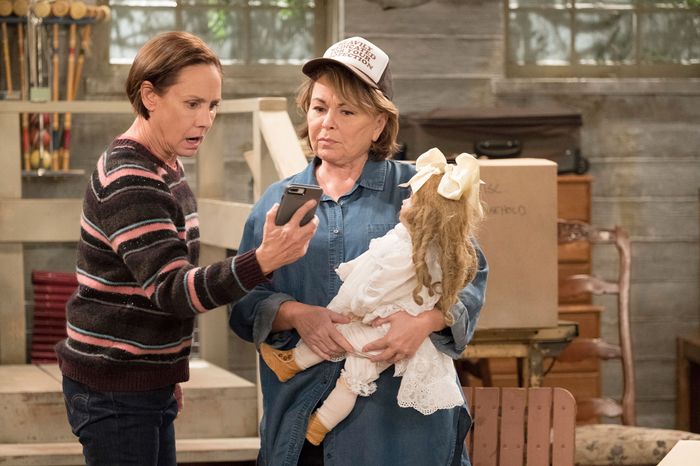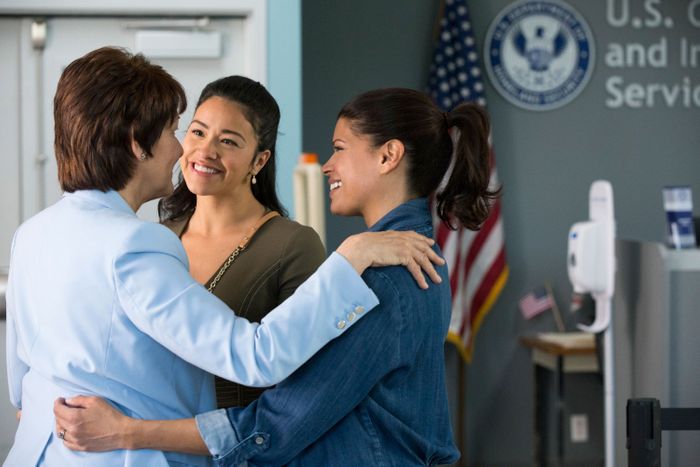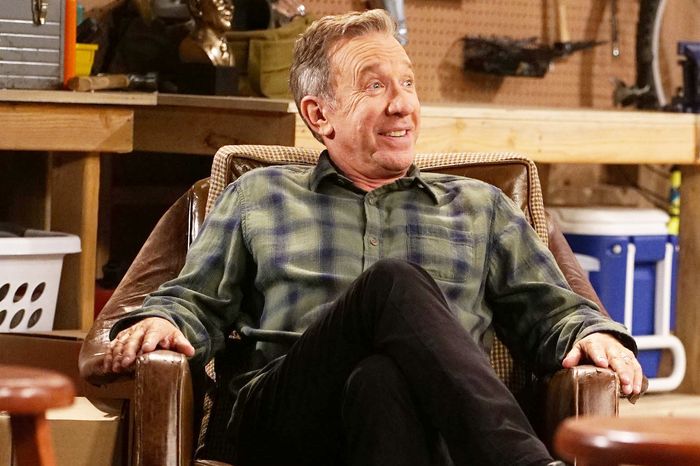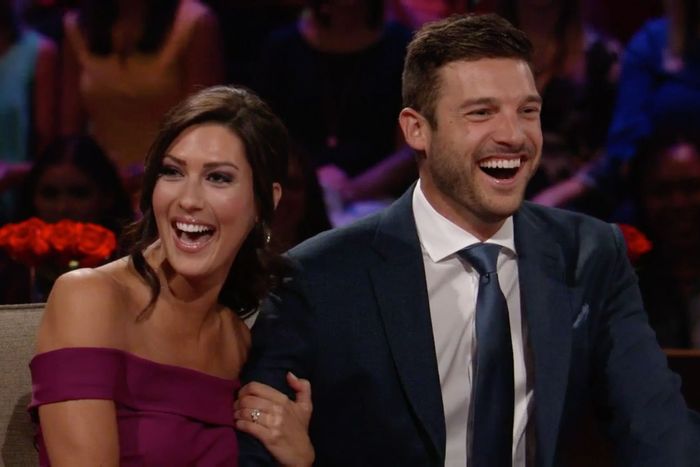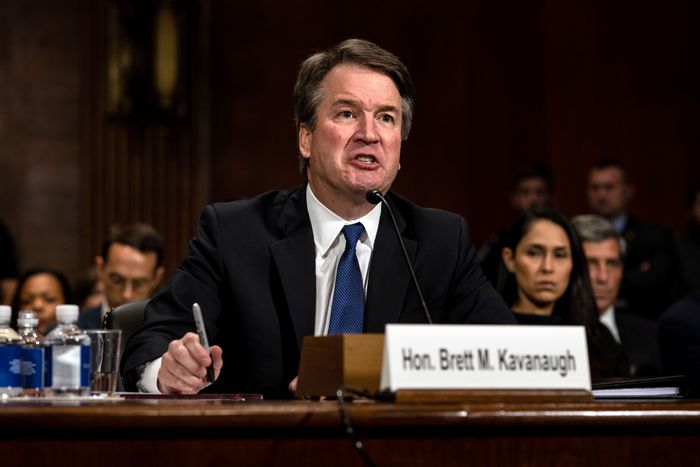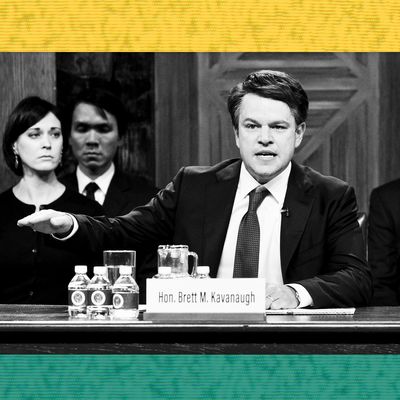
In 2018, TV of all shapes and genres was about, against, incorporating, responding to, or attempting to dodge the current political moment. In many instances, shows invited that clash of the political and the cultural, either by including plotlines that called out specific real-world policies, or by embroiling its characters in conflicts that echoed the narratives playing out on national news. But not all of the shows on this list intentionally grappled with politics. Like so many other aspects of life in the past year, it was simply impossible to escape getting caught by the prevailing political winds.
The Good Fight finds the pee tape
Michelle and Robert King’s The Good Fight is about life in the Trump era, but its second season was particularly direct about the most hot-button issues of the day. Diane Lockhart resorted to micro-dosing LSD to get through the trauma of watching the news, Jonathan Coulton wrote a Schoolhouse Rock--style song about impeachment, and one of the law firm’s investigators was nearly deported after he’s arrested for driving while black and the cops discover his citizenship papers were fake. The most baldly political moment, though, goes to the story line about a Russian prostitute named Dominika who tries to avoid deportation by offering up a bona fide copy of the infamous pee tape. Eventually, because The Good Fight loves us all and wants us to be happy, it also loops in Margo Martindale.
ABC shelves Black-ish’s kneeling episode
One of the biggest political stories on TV this year is about something that never aired: In March, Variety reported that the ABC sitcom Black-ish had shot an episode about NFL players protesting police violence by kneeling during the national anthem, that the episode had been scheduled to run in February, and that ABC then pulled and shelved it indefinitely. The episode was directed by showrunner Kenya Barris; in August, Barris left ABC for a massive deal with Netflix. Although Barris has stopped short of directly criticizing ABC’s decision to pull the episode, he’s strongly implied that it played a factor in his choice to leave: “I don’t know that I would’ve been as useful to them as they’d need me to be after that,” he said in September.
Child separation on The Handmaid’s Tale
Like The Good Fight and a few other series on this list, The Handmaid’s Tale is a show with a perpetual political resonance regardless of the specific story it’s telling in any given episode. Even in the context of a show about what happens when women’s reproductive rights are stripped away by a patriarchal society in a world devastated by climate change, the second season also hit on an uncannily timely subject: Just as Americans learned about the Trump administration’s policy of separating children from parents who attempted to immigrate to the States illegally, The Handmaid’s Tale ran “The Last Ceremony,” an episode where Elisabeth Moss’s character was reunited with her young daughter, only to be physically ripped from her once again. In addition to being a remarkable scene for Moss, it became a stark, if unintentional commentary on one of the year’s biggest political controversies.
Miss Tammye’s family reunion on Queer Eye
Queer Eye’s second season premiere was one of the most absolutely endearing episodes of the show to date. In it, the Fab Five give a makeover to a woman named Miss Tammye, who requests that they help her host her church’s annual homecoming service, but also that they help revive her relationship with her son, a gay man who feels ostracized by Miss Tammye’s conservative church family. It’s an episode about one family, and also about how to love one another in a divisive time.
The end of Roseanne
The spring premiere of the Roseanne reboot was an opportunity for everyone to write about the intersection of TV and politics. The show was never more political than in its final episode, though, where its claim to be taking on serious political stories collapsed into a dramatic, pass-the-buck closing fairy tale about federal aide and the opioid crisis. And then, although nobody had intended it to be so, Roseanne Barr’s Twitter habits turned that into the last episode of the show. Roseanne’s end is a prime example of one of the common threads in politics on TV in 2018: A show that purposely wrestled with the political landscape was not deft enough to do it well, and ended up getting trounced by that very same landscape. Roseanne and Roseanne Barr are like the fable of the scorpion and the frog: ABC yoked its lot to Roseanne to capture her political zeal, then that same political zeal (a.k.a. racism) is what ultimately sunk the show.
Jane the Virgin’s Alba and One Day at a Time’s Lydia become American citizens
This year, TV most often reflected the current political moment in depressing or tragic ways, if not hilariously depressing or tragically hilarious ones. But there were a few glorious happy spots, like the two plotlines on Jane the Virgin and One Day at a Time about women who took the leap into American citizenship. Alba and Lydia had put off becoming citizens for different reasons: Alba, on Jane the Virgin, was initially undocumented and spent many years in fear of deportation; Lydia, on ODAAT, had a green card but never felt like she belonged in America and didn’t want to abandon her Cuban roots. For both of them, though, the moment they at last became citizens is overwhelmingly emotional, and Alba’s speech after her citizenship ceremony is a lovely summary of the experience. After talking about the meaning of e pluribus unum, Alba tells her family, “I spent so many years worrying about being separated from all of you, and I’m so grateful that I’ll never have to worry about that again.”
Hannah Gadsby at the Emmys
Neither Gadsby’s breakout stand-up show Nanette nor her appearance at the Emmys was as on-the-nose political as, say, The Good Fight’s pee-tape plot. Nanette is a meditation and deconstruction of the dangerous self-effacement of stand-up comedy; it’s a show about how we write narratives about ourselves, so it’s “political” because it’s tilted against the prevailing winds of patriarchal power structures. That’s why, in its own way, Gadsby’s appearance in front of the Emmys audience felt like a test of how well Nanette could translate to a bigger, broader platform. She did not disappoint: “This is not normal,” she began. “Somebody like me to get this sweet gig — free suit, new boots — just because I don’t like men!” And then, in a direct Nanette echo, she laughed, “Just jokes, fellas, calm down.” Though Gadsby’s appearance was perfectly polite, there was also a palpable undercurrent of her real anger about gender politics, as well as the looming ghost of her rage in Nanette. In a year when female anger was one of the returning threads of political discourse, Gadsby at the Emmys was one of the few moments when that anger broke through the usual Hollywood patter.
Last Man Standing returns
While Roseanne was the TV revival most laden with cultural and political meaning in 2018, this was also the year that Last Man Standing was revived to conservative fanfare. Its cancellation in 2017 was decried as a means of censoring conservative viewpoints, even as then-president of ABC Entertainment explained that the cancellation was partly timed to avoid contract renegotiations. The show was canceled by ABC and then revived by FOX; in the revival’s handful of episodes so far, Tim Allen’s character Mike Baxter has made cracks about Hillary Clinton, the travel ban, and Trump’s child-separation policy. More than any particular moment on the show, Last Man Standing is political because of its mere existence — the original iteration was beloved by a group of conservative viewers who felt themselves underrepresented on TV, and its return was celebrated as a victory for conservative viewpoints.
The Bachelorette’s Instagram scandal
For the first time in its 16-year history, The Bachelor franchise had to wrestle with the possibility that politics could seriously affect potential compatibility of two reality-show-destined soul mates. Even before the season could get underway, careful Bachelorette watchers noticed that Garrett Yrigoyen, an early front-runner, had a history of hitting “like” on racist, transphobic, and misogynistic Instagram memes. This was an issue not just because it’s gross, but also because that season’s Bachelorette, Becca Kufrin, was a vocal Hillary Clinton supporter. It became such a story that when Yrigoyen was revealed as the season’s winner, Kufrin and Yrigoyen both had to address the controversy on the “After the Final Rose” live special. Not to worry, though: Yrigoyen announced that they “got through that together,” and as recently as early December were performing the inevitable act of any Bachelor franchise couple that’s still together — couple’s sponcon.
The Brett Kavanaugh hearings
Everything else on this list is an instance where intense consciousness of the current political moment leaked into fictional or unscripted reality TV. But the Brett Kavanaugh hearings — specifically, the day when Dr. Christine Blasey Ford testified about her high-school assault and then–Supreme Court nominee Brett Kavanaugh responded to her accusation — were an instance where a televised political event seemed to spill into all other areas of culture. It was a momentous, shattering day in and of itself, but much of its overwhelming cultural impact came from its being broadcast live on TV. Everyone could watch Dr. Ford give careful, considered, controlled testimony about what happened to her. Everyone could watch the immediate response from the Senate, where even GOP lawmakers remarked that they found her credible. And then, everyone could watch as Kavanaugh came out and tantrumed his way into a Supreme Court seat. Maybe more than any other single moment on TV in 2018, the Kavanaugh hearings felt like a distillation of the year’s intense intersection of politics and culture.
Matt Damon plays Brett Kavanaugh on SNL
As befits any particularly visible moment in American politics, the Kavanaugh hearings were immediately followed by a Saturday Night Live parody. Matt Damon played Kavanaugh, and he walked onstage in the show’s cold open in full rage mode, ready to shift into red-faced tearfulness as soon as he pulled out the replicas of Kavanaugh’s strange high-school calendars. As Mark Harris noted, the sketch was both an uncannily completist replication of what America just watched, and also absent any real political angle on the hearings. It was more about checking boxes than it was about building a case for or against Kavanaugh, and like the hearings themselves, it became a prime opportunity for a referendum on the current state of politics and comedy.
The Kinder-Guardians sketch in Who Is America?
Showtime must’ve hoped that Sacha Baron Cohen’s sketch politics show Who Is America? would turn into must-watch TV, the sort of thing that would drive conversations and become a major player in current political discussions. After the first few episodes, Who Is America? seemed to exhaust all of its ideas, though, and the season went from buzz to fizzle. But before it faded, the show did have one really affecting, gut-churningly alarming bit: the Kinder-Guardians sketch, where Baron Cohen’s gun-loving Israeli soldier character asked American politicians to help him promote a program that gives guns to preschoolers. Even in the context of the show’s juvenile, gotcha-style humor, watching people like Trent Lott, Joe Walsh. and Dana Rohrabacher either espouse or refuse to denounce a plan to give guns to 4-year-olds was sickeningly effective TV.
Murphy Brown’s Steve Bannon episode
In its brief tenure so far, the Murphy Brown revival has taken many stabs at the current political landscape. Murphy and a fictional Donald Trump had an on-air Twitter battle, Murphy sneaked into the White House briefing room and delivered a denunciation of Sarah Sanders’s constant lying, and Hillary Clinton even made a cameo. In the fourth episode of the season, “Three Shirts to the Wind,” Murphy Brown hit Peak Politics. The episode is a takeoff of the brouhaha surrounding the New Yorker festival’s brief invitation (and then swift cancellation) of a conversation with Steve Bannon. On Murphy Brown, Murphy decides not to book Bannon on her show, but still takes an opportunity to deliver a Bannon smackdown when she sees him in private. The episode is good, but the best part is Bannon as performed by the excellent David Costabile.
Superstore tackles maternity leave
This year, the NBC sitcom Superstore had a multi-episode, deeply felt, heartrending plot arc about the cruelty of nonexistent maternity-leave policies at major American corporations. In some ways, this is familiar territory for the show — one of the smartest and sweetest sitcoms currently on TV — because Superstore has had multiple stories about inhumane parental-leave policies, going back to its first season finale. But in its fourth season, one of the main characters, Amy, gets kicked out of her preferred hospital because it doesn’t take her insurance, and then has to show up at work two days after giving birth. It’s played for laughs, but Amy’s exhaustion and pain are brutal. “I am so tired!” she yells at her boss, who’s tried to give her bath bombs to make her feel better. “I have slept 90 minutes in three days. The lining of my uterus is coming out in clumps. I have hemorrhoids so big that my doctor looked at my asshole and said, ‘Whoa!’ […] I am wearing frozen diapers so that my pussy doesn’t fall out, okay?!” It’s one of the most physically real moments on TV this year, even the bleeped version, and it’s also a devastating indictment of corporate culture.
Every minute of America to Me
The Starz docuseries America to Me is not a “moment,” and pulling out any single scene would do a disservice to the series as a whole, which is a masterful portrait of an American high school in a diverse Chicago suburb. America to Me is the best thing about the current state of America I watched all year, even though (and maybe because) it has almost nothing to do with Donald Trump. While so many of the examples on this list are just that — examples, short blips of political flag-waving inside of longer stories — America to Me’s entire premise is to provide a probing, lengthy, multilayered look at the realities of institutional politics. Its political content is neither accidental, nor is it performed through cameo-style shout-outs. The docuseries lingers. It shows moments of real sadness, tragic family backstories, and maddening institutional blindness. And even while it tells a story about seemingly faceless administrations and bland, apersonal policies, the show’s strengths are in how mundane and human it all feels. As much as the rage and injustice, America to Me is about the compassion and humor and happiness it finds in its portraits of several high-school students. There was nothing on TV that moved me more this year, and nothing that touched America to Me’s capacity for putting sweeping historical and institutional bias in the context of everyday life.



